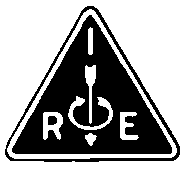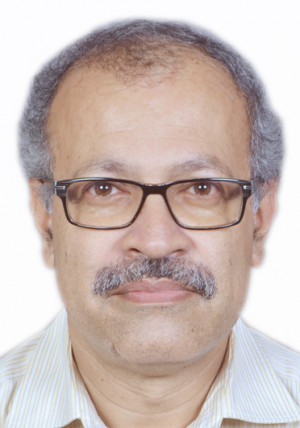Related Research Articles

Electrical engineering is an engineering discipline concerned with the study, design, and application of equipment, devices, and systems which use electricity, electronics, and electromagnetism. It emerged as an identifiable occupation in the latter half of the 19th century after the commercialization of the electric telegraph, the telephone, and electrical power generation, distribution, and use.

Electronics is a scientific and engineering discipline that studies and applies the principles of physics to design, create, and operate devices that manipulate electrons and other electrically charged particles. Electronics is a subfield of physics and electrical engineering which uses active devices such as transistors, diodes, and integrated circuits to control and amplify the flow of electric current and to convert it from one form to another, such as from alternating current (AC) to direct current (DC) or from analog signals to digital signals.

The Institute of Electrical and Electronics Engineers (IEEE) is an American 501(c)(3) professional association for electronics engineering, electrical engineering, and other related disciplines.

The Institute of Radio Engineers (IRE) was a professional organization which existed from 1912 until December 31, 1962. On January 1, 1963, it merged with the American Institute of Electrical Engineers (AIEE) to form the Institute of Electrical and Electronics Engineers (IEEE).
The following outline is provided as an overview of and topical guide to electrical engineering.
This is an alphabetical list of articles pertaining specifically to electrical and electronics engineering. For a thematic list, please see List of electrical engineering topics. For a broad overview of engineering, see List of engineering topics. For biographies, see List of engineers.
Petar V. Kokotovic is professor emeritus in the College of Engineering at the University of California, Santa Barbara, USA. He has made contributions in the areas of adaptive control, singular perturbation techniques, and nonlinear control especially the backstepping stabilization method.

Electrical/Electronics engineering technology (EET) is an engineering technology field that implements and applies the principles of electrical engineering. Like electrical engineering, EET deals with the "design, application, installation, manufacturing, operation or maintenance of electrical/electronic(s) systems." However, EET is a specialized discipline that has more focus on application, theory, and applied design, and implementation, while electrical engineering may focus more of a generalized emphasis on theory and conceptual design. Electrical/Electronic engineering technology is the largest branch of engineering technology and includes a diverse range of sub-disciplines, such as applied design, electronics, embedded systems, control systems, instrumentation, telecommunications, and power systems.
The following outline is provided as an overview of and topical guide to automation:

Brian David Outram Anderson is Professor in the Research School of Information Sciences and Engineering at the Australian National University. His research interests include circuits, signal processing and control, and his current work focuses on distributed control of multi-agent systems, sensor network localization, adaptive and non-linear control. Professor Anderson served as President of the Australian Academy of Science from 1998 to 2002.

Electronic engineering is a sub-discipline of electrical engineering that emerged in the early 20th century and is distinguished by the additional use of active components such as semiconductor devices to amplify and control electric current flow. Previously electrical engineering only used passive devices such as mechanical switches, resistors, inductors, and capacitors.
The field of electrical and electronics engineering has grown to include many related disciplines and occupations.
Robert David Middlebrook was a professor of electrical engineering at the California Institute of Technology (Caltech). He is most well known in the field of power electronics and as a proponent of design-oriented circuit analysis.

Saraju Mohanty is an Indian-American professor of the Department of Computer Science and Engineering, and the director of the Smart Electronic Systems Laboratory, at the University of North Texas in Denton, Texas. Mohanty received a Glorious India Award – Rich and Famous NRIs of America in 2017 for his contributions to the discipline. Mohanty is a researcher in the areas of "smart electronics for smart cities/villages", "smart healthcare", "application-Specific things for efficient edge computing", and "methodologies for digital and mixed-signal hardware". He has made significant research contributions to security by design (SbD) for electronic systems, hardware-assisted security (HAS) and protection, high-level synthesis of digital signal processing (DSP) hardware, and mixed-signal integrated circuit computer-aided design and electronic design automation. Mohanty has been the editor-in-chief (EiC) of the IEEE Consumer Electronics Magazine during 2016-2021. He has held the Chair of the IEEE Computer Society's Technical Committee on Very Large Scale Integration during 2014-2018. He holds 4 US patents in the areas of his research, and has published 500 research articles and 5 books. He is ranked among top 2% faculty around the world in Computer Science and Engineering discipline as per the standardized citation metric adopted by the Public Library of Science Biology journal.

Payam Heydari is an Iranian-American Professor who is noted for his contribution to the field of radio-frequency and millimeter-wave integrated circuits.

Soumitro Banerjee is an Indian electrical engineer and former director of the Indian Institute of Science Education and Research, Kolkata. He is known for his studies on bifurcation phenomena in power electronic circuits and is an elected fellow of all three major Indian science academies: the National Academy of Sciences, India, Indian Academy of Sciences, and Indian National Science Academy. He is also a fellow of The World Academy of Sciences, Institute of Electrical and Electronics Engineers, West Bengal Academy of Sciences and the Indian National Academy of Engineering. The Council of Scientific and Industrial Research, the apex agency of the Government of India for scientific research, awarded him the Shanti Swarup Bhatnagar Prize for Science and Technology, one of the highest Indian science awards for his contributions to Engineering Sciences in 2003.
Ranjan Kumar Mallik is an Indian electrical and communications engineer and a professor at the Department of Electrical Engineering of the Indian Institute of Technology, Delhi. He held the Jai Gupta Chair at IIT Delhi from 2007 to 2012 and the Brigadier Bhopinder Singh Chair from 2012 to 2017. He is known for his researches on multiple-input multi-output systems and is an elected fellow of all the three major Indian science academies viz. Indian Academy of Sciences, Indian National Science Academy, and The National Academy of Sciences, India. He is also an elected fellow of The World Academy of Sciences, Indian National Academy of Engineering, and The Institute of Electrical and Electronics Engineers, Inc.
Yendluri Shanthi Pavan is an Indian electrical engineer and a professor at the Department of Electrical Engineering of the Indian Institute of Technology, Madras. He is known for his studies on mixed signal VLSI circuits and is an elected fellow of the Indian National Academy of Engineering. He is also a fellow of IEEE. The Council of Scientific and Industrial Research, the apex agency of the Government of India for scientific research, awarded him the Shanti Swarup Bhatnagar Prize for Science and Technology, one of the highest Indian science awards for his contributions to Engineering Sciences in 2012.